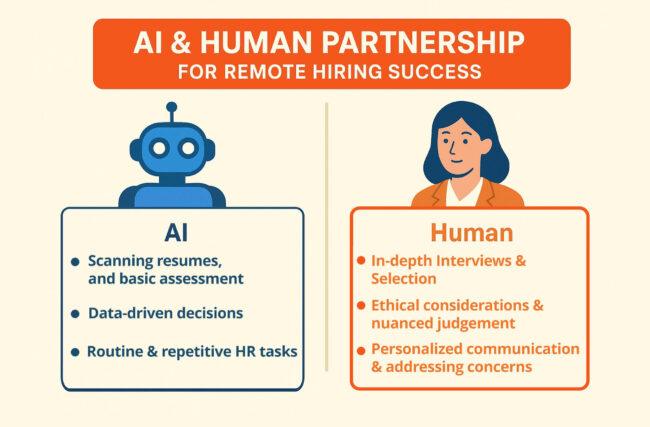Can AI Replace Human Judgment in the Quest for Remote Hiring?
The landscape of talent acquisition has undergone a seismic shift, with remote hiring becoming a cornerstone of modern recruitment strategies. In this evolving terrain, Artificial Intelligence (AI) has emerged as a powerful force, promising to revolutionize how companies discover, assess, and engage with prospective employees. With the share of HR leaders actively planning or deploying Generative AI, as detailed in a report by Gartner, the allure of AI-driven tools is undeniable.
However, as we increasingly integrate AI into our remote hiring processes, a critical question arises: can algorithms truly replace the nuanced judgment and inherent understanding that human recruiters bring to the table? At eDev, we believe that while AI offers tremendous advantages, the human touch remains indispensable in the quest for building exceptional and cohesive remote teams.
The Heavy Lifting: How AI Streamlines Remote Recruitment
AI’s strengths in remote tech hiring lie primarily in its ability to handle voluminous, repetitive tasks with speed and accuracy, freeing up human recruiters to focus on more strategic and interpersonal aspects. Here are some key areas where AI performs exceptionally well:
- Sourcing and Candidate Discovery: AI-powered tools can scour vast databases of resumes, online professional profiles, and social media platforms, identifying potential candidates who match specific skillsets and experience criteria. This automated sourcing significantly expands the talent pool beyond geographical limitations, a crucial benefit for companies looking to tap into global expertise.
- Initial Screening and Resume Parsing: AI algorithms can efficiently parse through hundreds, even thousands, of applications, extracting key information and ranking candidates based on predefined requirements. This drastically reduces the time spent on manual resume review, allowing recruiters to focus on engaging with more promising individuals.
- Automated Communication and Scheduling: AI-powered chatbots can automate initial outreach to candidates, answer frequently asked questions, and schedule interviews across different time zones, a significant logistical advantage for global hiring. These tools ensure timely communication and a smoother candidate experience.
- Skills Assessment and Testing: AI platforms can administer and evaluate a wide range of online assessments, including coding challenges, technical quizzes, and aptitude tests, providing an objective measure of a candidate’s skills and abilities, regardless of their location.
These AI-driven efficiencies can dramatically accelerate the initial stages of the remote tech hiring process, saving recruiters valuable time and resources that can be better allocated to more human-centric interactions.
Is AI Hiring Inherently Biased? Unpacking the Claims
One of the most debated aspects of AI in hiring is the potential for algorithmic bias. While proponents argue that AI can reduce human biases, critics point to the fact that AI systems are trained on data, and if that data reflects existing societal or historical biases, the AI will inevitably perpetuate and even amplify them.
As a report from the Brookings Institution notes, there is “mounting evidence that such tools can reproduce and even exacerbate human biases manifested in the datasets on which these tools are built.” Reports claiming AI hiring is biased often highlight the following reasons:
- Biased Training Data: AI algorithms learn patterns from the data they are fed. If historical hiring data overrepresents certain demographics or underrepresents others for specific roles, the AI will learn to favor those patterns, even if they are not based on merit.
- Flawed or Incomplete Features: The features or criteria that AI algorithms use to evaluate candidates might inadvertently correlate with demographic factors, leading to discriminatory outcomes. For instance, relying heavily on the prestige of a candidate’s university might disadvantage individuals from less privileged backgrounds, regardless of their skills.
- Lack of Contextual Understanding: AI struggles to understand the nuances of language, cultural differences, and the context behind a candidate’s experiences, potentially leading to unfair evaluations based on superficial factors. This is particularly relevant in global remote hiring, where cultural backgrounds and communication styles can vary significantly.
Addressing bias in AI hiring requires careful attention to the data used for training, ongoing monitoring of algorithmic outcomes, and a commitment to ensuring fairness and equity in the recruitment process. Human oversight and ethical considerations are crucial in mitigating these risks.
Recruitment Stages Where AI Cannot Replace Human Judgment
Despite its impressive capabilities, AI falls short in several critical stages of remote hiring where human judgment, empathy, and intuition are paramount:
- Assessing Cultural Fit and Soft Skills: While AI can analyze communication patterns, it cannot truly gauge whether a candidate will integrate seamlessly into a team’s culture, share core values, and collaborate effectively in a remote environment. Assessing soft skills like leadership, communication, problem-solving, and adaptability requires nuanced human interaction and behavioral interviewing techniques.
- Evaluating Motivation and Passion: AI can identify skills and experience, but it cannot discern a candidate’s genuine passion for the role, their long-term career aspirations, or their intrinsic motivation to contribute to the company’s mission. Understanding these drivers requires human recruiters to engage in meaningful conversations that go beyond surface-level qualifications.
- Navigating Complex Negotiations and Building Relationships: The final stages of the hiring process often involve complex negotiations regarding compensation, benefits, and other terms. Building a strong rapport with the candidate and effectively addressing their concerns requires human empathy, interpersonal skills, and the ability to understand individual needs and motivations.
- Identifying and Mitigating Unconscious Bias: While AI aims to reduce bias, as discussed earlier, it can also perpetuate it. Human recruiters, trained in diversity and inclusion practices, are essential for identifying potential biases in the hiring process and ensuring a fair and equitable experience for all candidates. They can provide crucial contextual understanding and challenge algorithmic recommendations when necessary.
- Providing a Human Touch and Positive Candidate Experience: Even in a remote setting, the human element in the hiring process is crucial for creating a positive candidate experience and building a strong employer brand. Candidates appreciate personalized communication, empathetic understanding, and the opportunity to connect with a real person who can answer their questions and address their concerns.
The Power of Partnership: AI and Human Intelligence for Hiring Success
The most effective approach to remote hiring in today’s world is not to view AI and human judgment as mutually exclusive but rather as complementary forces that work in synergy. The future of successful talent acquisition lies in strategically leveraging the strengths of both.
- AI for Efficiency, Humans for Insight: AI can handle the initial heavy lifting of sourcing, scanning resumes, and basic assessment, freeing up human recruiters to focus on in-depth technical & HR interviews, cultural fit evaluations, and building genuine connections with candidates.
- Data-Driven Decisions with Human Oversight: AI can provide valuable data and insights to inform hiring decisions, but human recruiters must provide the critical context, ethical considerations, and nuanced judgment to interpret that data effectively and ensure fairness.
Enhancing the Candidate Experience: By automating routine tasks, AI can contribute to a smoother and more efficient candidate experience. However, human interaction remains essential for providing personalized communication, addressing concerns, and creating a positive and memorable impression.

At eDev, our philosophy is rooted in this powerful partnership. We leverage cutting-edge AI tools to streamline our remote recruitment processes, enabling our experienced human recruiters to focus on what they do best: understanding the unique needs of our clients and connecting them with exceptional & dedicated developers on-demand who not only possess the required skills but also align with their company culture and long-term vision.
In conclusion, while AI offers tremendous potential to enhance the efficiency and reach of remote hiring, it cannot and should not replace human judgment. The complexities of assessing cultural fit, understanding motivations, mitigating bias, and building meaningful relationships require the uniquely human capabilities of empathy, intuition, and critical thinking. The key to successful remote talent acquisition lies in forging a strategic alliance between AI and human intelligence, harnessing the power of technology while preserving the invaluable human touch.





























